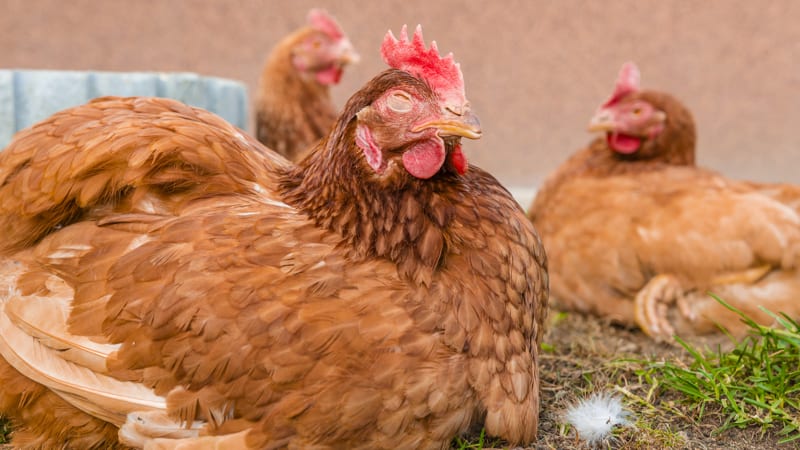Something to Crow About, by Randy Fitzgerald
New pets making a statement in the neighborhood

Back in the ’60s, the Smothers Brothers released an album called Mom Always Liked You Best, and on the cover was Dick Smothers, standing amid all the dream treasures of childhood – a scooter, wagon, beachball and his faithful dog. Opposite him sat his brother, Tom, not a toy of his own in evidence, but holding his pet chicken, Frank, on a leash.
I’ve kidded my wife, Barb, many times about the pet chicken she had as a child. She swears that Weegie was almost as good a pet as her little fox terrier, Mutt, but I can’t imagine that to have been true. Chickens don’t sound to me like good pets. They peck, they mess up the yard, they cock-a-doodle-doo at daybreak, they ruin your garden, they chase you around and some even have spurs. But in my neighborhood, I’m badly outnumbered on this issue.
My neighborhood social network reveals that a good number of urbanites in Richmond keep a pet chick or two in the backyard – part of a national trend since the 2000s. Chicken-keeping originates as much out of affection and appreciation for chickens as for a desire for daily fresh eggs. Hen owners worry like, well, mother hens over the presence of hawks and dogs. They look askance at possums, skunks and raccoons, and a sighting of a fox or coyote brings terror to the ’hood. Concern is justified, as reports of chicken catastrophes surface every few weeks. “We lost our Silkie and a Legbar last month to a hawk and a possum,” someone reports. A discussion of coops ensues.
Neighbors weigh the relative merits and beauty of a Silver Wyandotte vs. an Australorp, a Silkie vs. a Cream Legbar – or closer to home perhaps, a Rhode Island Red vs. a New Hampshire. I learned from the site that different varieties of chickens apparently live together very happily, never seeming to notice that they lay different color eggs. Did you know a number of hens lay blue eggs (Araucanas, Easter Eggers, Cream Legbars)? I would think those would be a little hard to live with, like an old man with a good head of hair or a kid who can crack his knuckles.
One lady wrote that her pet chicken is super-friendly, follows her all over the yard and puts itself to bed at night. (Make that “herself.” The “girls” is a frequent endearment.)
The owner of an Australorp, a Golden Laced Wyandotte and an Easter Egger posts pictures of her brood: “It’s a wonderful hobby,” she says. “They’re fascinating to watch – and educational for the kids – and oh, those warm, fresh eggs.” When her dogs killed two of her chickens, her own education was advanced: “Dogs are fine individually,” she said, but not together … We were very sad and learned something about nature.”
I’m learning, too. Hens can get egg-bound on frigid nights and occasionally they “go broody,” meaning they suddenly hear their biological clocks ticking and decide to hatch their eggs and raise chicks. (This is when they’re likely to bite you!) A male neighbor offers advice about cutting the feathers on the end of one wing to keep a chicken from flying into trees to roost or over the fence to escape. (One wing only, please.) Hens can fly, but only for about 10 feet up and 40 to 50 out. (Do not drop them from airplanes at Thanksgiving!)
I didn’t name the chicken keepers here because I (and possibly they) are a bit unsure of what restrictions the city puts on raising chickens as to location, numbers and rules. And I anticipate your asking more about Barb’s chicken, Weegie. Alas, Mutt, the faithful fox terrier (yes, accompanied by another dog) turned on Weegie one bright Saturday afternoon, and that gentle soul offered her “last full measure of devotion” when the preacher came for Sunday dinner the next day.
Randy Fitzgerald is the author of Flights of Fancy: Stories, Conversations and Life Travels with a Bemused Columnist and His Whimsical Wife, published last fall. He was a longtime public relations director at the University of Richmond and columnist for The Richmond News Leader and the Richmond Times-Dispatch and taught modern American literature at Virginia Union University. RFitzger@gmail.com


